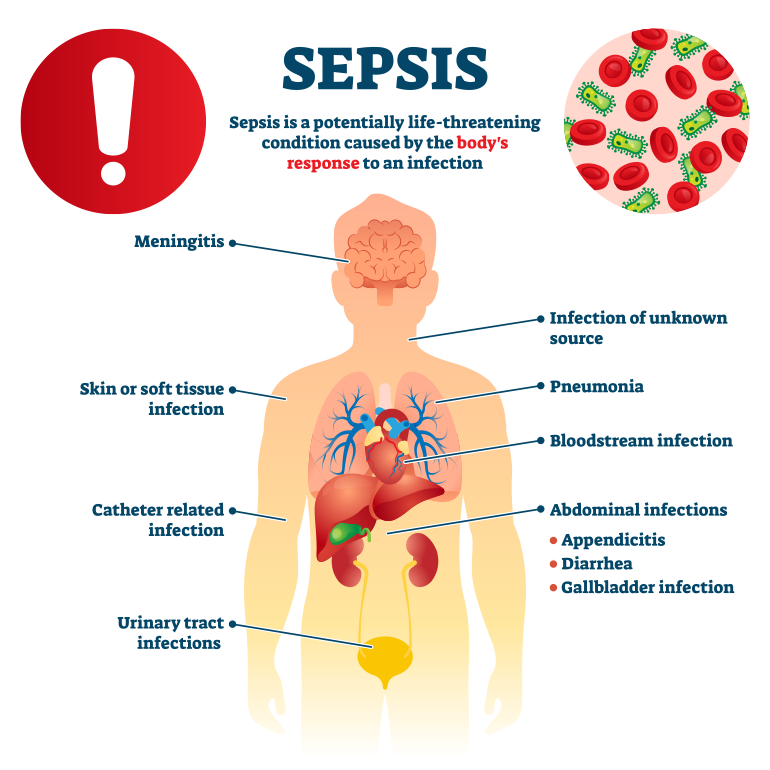Subscribe to get weekly insights
Always stay up to date with our newest articles sent direct to your inbox
Published on 28 Apr, 2023
Updated on 7 Aug, 2025
3387 Views
3 min Read

Written by Care Health Insurance
favorite1Like
Sepsis is probably the first thing that comes to mind when you hear about blood infection. According to a survey, sepsis takes more lives in India than in other South Asian countries. More than half of the patients in intensive care units (ICUs) in India usually suffer from sepsis. Such cases have increased sharply over the years, and there is hardly any awareness about this life-threatening blood infection.
Here is all you need to know about sepsis, its symptoms, causes and treatment.
Sepsis happens when chemicals start releasing in the bloodstream to fight an infection that triggers inflammation, becoming a life-threatening emergency. This causes a cascade of bodily changes that damage multiple organ systems, such as the lungs, urinary tract, skin, or gastrointestinal tract, leading them to fail, sometimes even resulting in death. It can have severe complications that can’t be cured if it goes uncontrollable. In this case, only immediate medical assistance can increase the chances of survival.
Sepsis has three stages, and none of them is less severe than any of the stages. Stages are-
Sepsis- The infection gets into your bloodstream resulting in inflammation.
Severe Sepsis- It causes severe illness and inflammation that affects organ function.
Septic Shock- This leads to even more severe complications of sepsis, causing a major drop in blood pressure resulting in-
Although sepsis occurs mainly in hospitals while you suffer from other ailments, it can also happen while sitting at home and fighting an infection that could lead to sepsis.
Although any infection can trigger sepsis, below listed are the types of infections that possess a higher risk of sepsis infection-

Possible reasons for the increase in sepsis infection also include:-
Getting immediate medical attention is important if you experience anything alarming. Below mentioned are a few common symptoms of sepsis infection-
In some cases where children and adults have communication challenges, dementia or learning disabilities, it becomes hard to identify the symptoms. Seeking medical assistance right away can lower the chances of severity.
>> Also Read: Blood Clots: Know the Causes, Risks, Symptoms and Treatment
Severe sepsis leads to complete organ failure. Below are the most common symptoms one can experience in case of severe sepsis-
When the sepsis infection is left untreated, it leads to septicemia. Septic can advance really fast to severe sepsis and then septic shock. This transition is more lethal. Below are the symptoms the patient could experience during a septic shock-
Any severe injury, infection or serious non-communicable disease can progress to sepsis. Also, there is vulnerability among the kind of people who have the below-mentioned conditions-
It is necessary to identify someone with an infection that may develop into sepsis. Although there is no specific diagnosis to diagnose sepsis, a health expert, your doctor may recommend the following tests to identify sepsis-
Blood tests- Blood cultures and complete blood count (CBC) tests to diagnose abnormal liver and kidney function, electrolyte abnormalities and clotting problems.
Blood oxygen level (SPO2)- This test helps to evaluate the oxygen level in your blood.
Urine tests- Tests like urine culture and urinalysis
Imaging tests- Tests like X-rays or CT scans.
The treatment of sepsis requires to start as soon as any sign or symptom proves it could be sepsis. If you are diagnosed with sepsis, your health expert will first put you in the hospital's intensive care unit (ICU) to begin the treatment. Following are the treatments you may receive to treat sepsis-
Sepsis is undoubtedly a deadly health condition if not diagnosed in time. To keep yourself safe, beware of all the possible alarming symptoms. This health condition arises due to chronic diseases such as cancer, liver cirrhosis, etc., which may end up exhausting all your savings. To cover yourself against such chronic illnesses, availing of critical health insurance by Care Health Insurance can come to your rescue and save you from shelling out your money on hospitalisation and treatment.
Disclaimer: The information mentioned above is for reference purposes only. Also, kindly consult a professional medical expert to verify the details of health concerns.
Thyroid : मामूली नहीं हैं महिलाओं में थायराइड होना, जानें इसके लक्षण और घरेलू उपचार Vipul Tiwary in Diseases
शुगर कंट्रोल कैसे करे? जानें, डायबिटीज में क्या खाना चाहिए Vipul Tiwary in Health & Wellness
हाई ब्लड प्रेशर को तुरंत कंट्रोल कैसे करें? देखें इसके उपाय Vipul Tiwary in Diseases
पैरों में दर्द किस कमी से होता है? जानें, इसके घरेलू इलाज Vipul Tiwary in Health Insurance Articles
Smog Season is Back: Are You Really Safe? Sejal Singhania in Health Insurance Articles
Amino Acids: The Unsung Heroes of Your Mental Well-being Jagriti Chakraborty in Mental Health
8 Reasons to Start Your Morning with Ajwain Water Jagriti Chakraborty in Home Remedies
Ice Water Face Dip: The 15-Second Beauty Hacks Celebs Swear By Jagriti Chakraborty in Home Remedies
Always stay up to date with our newest articles sent direct to your inbox
Loading...